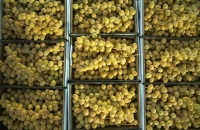
Barhi Date is one of the local dates in the Kingdom of Saudi Arabia . This fruit is a type of tree originally from Iraq and was introduced to the Arabian Peninsula by the people of Unayzah in Qassim Province , within the Kingdom. It holds a special position whether in Iraq or the Kingdom in general. Barhi date palm tree Currently, Barhi palm trees are widespread throughout most regions of the Kingdom. They are huge trees with long fronds and sturdy trunks that produce Barhi dates. These dates a...

The Saudi International Marine Exhibition is a specialized exhibition in the fisheries field that brings together entrepreneurs, brands, seafood exporters and suppliers, and those interested in fishing and aquaculture. The first edition was launched in 2021. The exhibition aims to capitalize on the fisheries market in the Kingdom of Saudi Arabia, foster investment partnerships contributing to the growth of the Saudi economy, and generate sustainable job opportunities that support the Gross Dome...
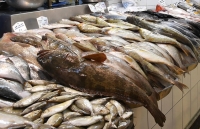
The Kingdom of Saudi Arabia 's fish production volume for 2022 reached 184,759 mt. The total catch from the Red Sea and Arabian Gulf fisheries amounted to 64,263 mt, with 23,846 mt coming from the Red Sea and 40,417 mt from the Arabian Gulf. Meanwhile, the total production from aquaculture in both saltwater and freshwater amounted to approximately 120,495 mt of fish, according to the 2022 annual report from the Ministry of Environment, Water, and Agriculture . The Kingdom has the Fisheries...
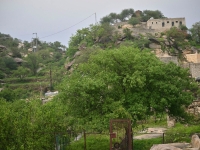
Peacock flower (Caesalpinia pulcherrima, Pride of Barbados, Dwarf Poinciana, Zahrat al-Tawose al-Ahmar) is a species of flowering plant in the pea family Fabaceae. It is a semi-evergreen plant native to Mexico. This aesthetically pleasing plant grows in Riyadh province into a shrub of no more than two m. Peacock flower cultivation Protected areas contribute to preserving the leaves of peacock flowers during the winter. Before falling, leaves turn red. This shrub is drought-resistant. However, a...
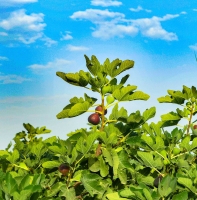
Fig Cultivation in the Kingdom of Saudi Arabia is widespread across most regions of the Kingdom, and the fruit is one of the seasonal crops achieving self-sufficiency levels, with production covering domestic consumption and leaving a surplus. Fig production in Saudi Arabia Fig is cultivated over an area exceeding 1,421 ha, distributed across eleven provinces within the Kingdom. The annual production reaches approximately 28,000 t, ensuring that the Kingdom achieves a self-sufficiency rate of 1...
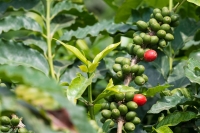
Yes, coffee beans are cultivated in the Kingdom of Saudi Arabia . The mountainous highlands of the southwest part of the Kingdom, particularly the provinces of Jazan , al-Bahah, and Aseer, are the most productive; with an annual production of 1,810 t of Arabian coffee beans in these mountain provinces. Additionally, there are nearly 2,535 farms containing about four hundred thousand coffee plants. Jazan Province encompasses more than 1985 coffee farms containing 340,000 coffee plants in the gov...
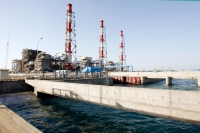
Shuqaiq Water Desalination Plant is located in Shuqaiq Center, affiliated with ad-Darb Governorate in Jazan Province , along the Red Sea coast. It is one of the key desalination plants operated under the Saudi Water Authority in the Kingdom of Saudi Arabia. Production capacity of Shuqaiq Water Desalination Plant The first phase of Shuqaiq Water Desalination Plant was established in 1989 to serve Aseer and Jazan Provinces , utilizing multi-stage flash distillation technology, with a production c...
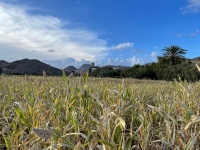
Corn Cultivation in the Kingdom of Saudi Arabia is primarily concentrated in the southwestern regions of the Kingdom due to their mountainous and plain terrain. These areas are ideal for farming because of the fertile soils, ranging from clay soil to loams, and the abundance of rainfall. Sorghum is a significant food crop for the residents of Aseer Province, where it is commonly referred to as 'al-Mutiyan' or 'al-Amati' by the locals. It is considered one of the oldest culti...
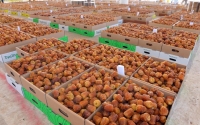
Khalas dates comprise 25 percent of all palm trees in the Kingdom of Saudi Arabia , making it the leading type in production and exports. It also ranks first in terms of the number of palm trees in Saudi Arabia. Riyadh Province holds the largest share of Khalas dates, with 3,200,668 producing palm trees, accounting for 40 percent of the total number of palm trees producing Khalas dates in Saudi Arabia. According to the General Authority for Statistics ' survey in 2019, the Eastern Province...
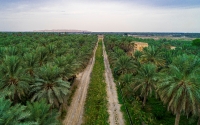
According to the agricultural production survey of the General Authority for Statistics for the year 2019, the number of palm trees in the Kingdom of Saudi Arabia reached approximately 31,234,155, while the quantity of palm production for the year 2018 reached about 1,539,755 t. The Riyadh Province ranked first in Saudi Arabia in terms of palm trees number, with a total of 7,924,947 palm trees, accounting for 25 percent of the total number in Saudi Arabia, followed by al-Qassim Province in the ...
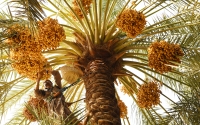
The dates production season starts in different regions of the Kingdom of Saudi Arabia from June to November of each year. Saudi Arabia has more than thirty-three million palm trees, with over 123 thousand agricultural holdings distributed across thirteen administrative regions. Saudi Arabia is renowned for producing some of the finest varieties of dates, including Barhi, Khudri, Khalas, Reziz, Sukkari, Shishi, Safawi, Safari, Sagai, Ajwa, Ambera, Halawi, Barni, Rothana, Maktoomi, Nabtat Ali, S...
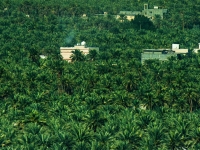
Palm Propagation in the Kingdom of Saudi Arabia refers to the process of increasing the number of palm trees in the Kingdom through various methods, including sexual propagation, vegetative propagation, and tissue culture propagation. The total number of palm trees in the Kingdom exceeds thirty-four million, producing more than 1.6 million t of various types of dates, according to a 2023 report by the Ministry of Environment, Water, and Agriculture. Additionally, date exports and their derivati...